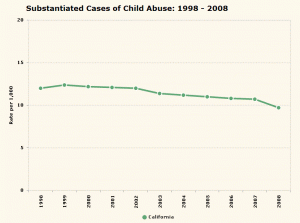Posts Tagged ‘New Data’
Finding Local Data on Substance Use Now Is Easier than Ever
In addition to the compelling drinking and driving data noted in the post below, numerous other substance use indicators also were added to kidsdata.org recently. These data also originated from the California Healthy Kids Survey (CHKS), which was developed and is administered by WestEd for the California Department of Education. Below are a few highlights for the state of California for the 2006-2008 reporting period. See all topics to view these student self-report data for your county or school district.
- 24% of 11th-grade boys and 21% of 11th-grade girls reported binge drinking in the past month before they took the survey.
- More than one-third of 11th-graders in the state report smoking marijuana at least once
- More than one in eight 11th-graders smoked cigarettes at least once in the past month before taking the survey.
- California students in 7th, 9th, and 11th grades are more likely to use alcohol than tobacco or other drugs.
- Students who report feeling less connected to their schools report higher levels of alcohol, tobacco, and other drug use.
For school districts and counties across California, these data are broken down by grade, gender, and students’ feelings of connectedness to their school, making CHKS an essential tool to researchers, policy makers, and those who work directly with kids in assessing how California’s adolescents are faring.
To be notified when these or any other data on kidsdata.org are updated, sign up for e-mail alerts.
Posted by Felicity Simmons
Tags: New Data, Statewide Expansion
How Prevalent Is Drinking and Driving Among Kids in CA? Local Data Provide Clues
Kidsdata.org just added 27 new indicators related to alcohol, tobacco, and other drugs. They all come from the California Healthy Kids Survey (CHKS), through a partnership with WestEd, which developed and administers CHKS for the California Department of Education.
This set of data includes 7th-grade students’ reports of riding in a car with a driver who had been drinking, and reports by 9th and 11th graders of drinking and driving or riding in a car driven by a friend who had been drinking. Here are some state-level findings for 2006-08:
- More than 40% of 7th graders said that they’d ridden in a car with a driver who had been drinking.
- Among 11th graders, girls were slightly more likely than boys to say that they had driven after drinking, or ridden in a car driven by a friend who had been drinking.
- Students with low levels of connection to school were most likely to say they had driven after drinking or ridden with a drinking driver – 14% said they had done so 7 times or more, compared to 6% of students with high levels of connectedness. (School connectedness is a summary measure that includes being treated fairly, feeling close to people, feeling happy, feeling part of school, and feeling safe at school.)
- Asian American students were most likely to report that they had never ridden in a car with a drinking driver or driven after drinking.
Find data for your county or school district:
Reports of Drinking and Driving or Riding with a Driver Who Had Been Drinking, by Grade and Gender
By Level of Connectedness to School
Posted by Sarah Marxer
Tags: New Data, Statewide Expansion
Do CA Kids Eat Breakfast?
Just launched on kidsdata.org: Indicators measuring student reports of whether they ate breakfast that day, available both by grade level (7th, 9th, and 11th) and gender, and by race/ethnicity. These data come from the California Department of Education’s California Healthy Kids Survey (CHKS), which is administered by WestEd.
So do California students eat breakfast? Here are some state-level highlights:
- The majority of 7th, 9th, and 11th graders say they eat breakfast.
- In 2006-2008, California 7th-grade students were more likely than 9th and 11th graders to say they ate breakfast that morning.
- Among 7th and 9th graders, boys were more likely than girls to say that they ate breakfast that morning.
- Asian American and Caucasian/White students were most likely to say they ate breakfast.
Posted by Sarah Marxer
Tags: New Data, Statewide Expansion
Child Safety Data Added for All CA Counties
 The kidsdata.org expansion continued in January with the addition of data about child safety — child abuse, foster care, and domestic violence — for all counties in California. In all, more than 25 indicators were added, and the data show some interesting tidbits
The kidsdata.org expansion continued in January with the addition of data about child safety — child abuse, foster care, and domestic violence — for all counties in California. In all, more than 25 indicators were added, and the data show some interesting tidbits
of information:
Child Abuse
- California’s rate of substantiated cases of abuse is declining, as are the number of cases.
- Race/Ethnicity: Native American, African American/Black kids disproportionately affected.
- Type of Abuse: Neglect is the most common.
- One-page highlights on child abuse >>
Foster Care
- In ‘08, 68,127 children in CA were in foster care, a 37% decline since ’98.
- The rate of first entries is down statewide and in most CA counties since ’98.
- CA infants enter foster care at roughly three times the rate of any other age group.
- One-page highlights on foster care >>
Domestic Violence
- Rate: The statewide rate of calls for assistance dropped 29% from ’98 to ’08.
- In 2008, there were 166,343 domestic violence calls to law enforcement.
- One-page highlights on domestic violence >>
As you may know, statewide data on many other topics will be added over the next few months as kidsdata.org continues its statewide expansion. View a timeline of when data will be added>>
Looking for data that aren’t included on that timeline? Let us know.
Posted by Felicity Simmons
Tags: New Data, Statewide Expansion


